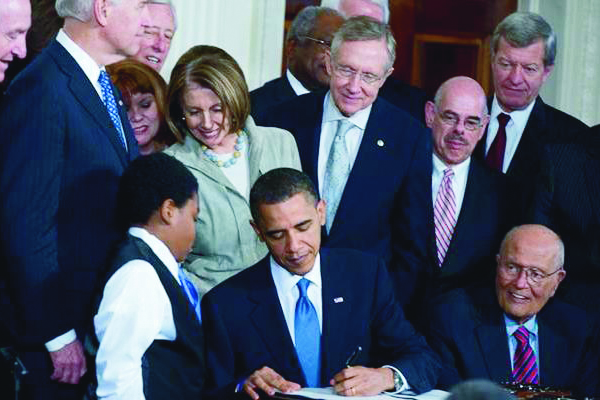Can States Nullify The Affordable Care Act?


Can a state unilaterally suspend the operation of ObamaCare within its borders? Of course not. That measure would violate the Supremacy Clause of the Constitution. We fought a Civil War over that question.
What if two states banded together to suspend the operation of ObamaCare within their common territory? Can they do that? The answer remains the same. No.
But let's try this. Let's have those two states - and others - now enter into a compact and submit it to Congress for its consent. What happens then? Article I, Section 10, Clause 3 of the Constitution forbids states from entering into any agreement or compact with another state without the consent of Congress. The converse meaning of that clause is that two states may enter into a compact if they obtain the consent of Congress. States have done this many times. An example is the Port Authority of New York and New Jersey.
Seven states, Utah, Oklahoma, Texas, Missouri, Indiana, Georgia and South Carolina have agreed to a compact to suspend the operation of federal healthcare laws within their territories. Ten more, Washington, Colorado, Kansas, Michigan, Ohio, Louisiana, Tennessee, Alabama, Florida and New Hampshire, are considering the measure. (The compact was vetoed or failed in the legislatures of Montana, North Dakota, Minnesota and Arizona.)
What would this compact do if Congress consents to it? Section Three articulates the principle that the legislatures (and by implication not the federal government) have the responsibility to regulate health care within their states. Section Four gives the signatory state the power, by legislation, to suspend the operation of federal health care laws in its state. But any aspect of federal law that is not specifically suspended by legislation continues to apply.
Federal health care law is suspended, but federal funding for health care is not. Section Five states that each year, each signatory state has a right to federal monies funded by Congress for health care as mandatory spending and not subject to annual appropriation. The exact amount is the amount the federal government spent in the member state in 2010 on health care (as defined in the compact), adjusted for population and inflation.
How do the member states get away with flaunting ObamaCare? Is ObamaCare not now the law of the land? The answer lies in the fact that Congress consents to the departure. As international treaties consented to by the Senate can override earlier federal statutes, so should an interstate compact consented to by Congress also have the power to override previous federal statutes on the same subject matter. Such an approval of a compact by the Congress supersedes ObamaCare itself in the signatory states. The compact benefits from the doctrine that the legislative branch of government knew and understood what it was doing and intended the override.
In the event that voters install a Congress in 2014 that is opposed to ObamaCare, the President will be incapable of stopping its nullification through this compact. As long as Congress consents to the compact, the president’s signature is unnecessary.
Can Congress revoke its consent to the compact once it has given its consent? That step could raise the same cluster of issues as abrogating a treaty. The Supreme Court may be called to decide.
If you think ObamaCare has done little to cure what is wrong with the healthcare system of the United States, and instead masked its symptoms, this initiative may be for you. Go to www.healthcarecompact.org for more information and communicate with your Governor, your state legislators, and your Congressional delegation.



